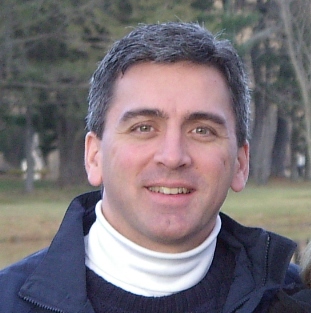
(RNS) A woman comforts another woman after a terrorist attack on the 117th Boston Marathon in Boston, Massachusetts April 15, 2013. For use with RNS-HOOVER-COLUMN, transmitted Jan. 30, 2015. Photo by Dominick Reuter/Reuters. *Eds: This photo can be used ONLY with RNS-HOOVER-COLUMN.
(RNS) Speaking at the World Economic Forum in Davos last Friday (Jan. 23), Secretary of State John Kerry doubled down on the administration’s long-standing refusal to label any terrorist incidents “Islamic.”
“Today we are witnessing nothing more than a form of criminal anarchy, a nihilism which illegitimately claims an ideological and religious foundation,” Kerry said.
But a growing chorus of critics has simply had it with this way of framing things. They all challenge the accuracy and utility of saying that the people butchering and beheading their way to a so-called caliphate are only “nihilists” who “claim” a religious foundation. To critics, these violent extremists may be a small minority of Muslims, but they are Muslim nonetheless.
Up to a point, there’s some merit in the critics’ argument. Though well-intentioned, the practice of avoiding religious labels so as to avoid conferring religious legitimacy can be taken to ludicrous extremes. Howard Dean recently made an easy target of himself by insisting that the Paris attackers were “about as Muslim as I am.”
There is, however, a deeply irresponsible gap in this recent surge of critical discourse about Islam. Almost nowhere has any serious credit or encouragement been given to Muslim reformers. These Muslims are working toward new interpretations and the revival of some existing, tolerant traditions of Islamic thought. The point is to develop and bolster foundations of support within Islam for human rights, religious freedom, and robust pluralism.
While it’s fair for a critic to ask tough questions about any religious tradition, Islam included, something is profoundly amiss if the questioner isn’t really interested in the possibility of answers. If the question is whether the dominant streams of Islamic thought and politics around the world today need to change, Muslim reformers would say yes, of course.
But will critics take yes for an answer? Most seem preoccupied with a terminological dispute over when and where to use the modifier “Islamic.”
This preoccupation is especially evident on the political right. Reacting to Kerry, Fox News commentator Charles Krauthammer fumed that the U.S. could “lose the damn war because we refuse to recognize who the enemy is.”
Krauthammer represents the more nuanced end of the Fox commentariat. Indeed, the tone of most of the conservative critique was set on Jan. 9, in less than 140 characters: Fox owner Rupert Murdoch tweeted that “Maybe most Moslems peaceful, but until they recognize and destroy their growing jihadist cancer they must be held responsible.”
Fox has since aired a steady stream of similar sentiments, along with some jaw-dropping errors. But Fox News is old news when it comes to criticisms of Islam. The network has been skeptical about Islam being a “religion of peace” since George W. Bush said it was in the immediate aftermath of 9/11. What’s more interesting is the recent turn toward criticism of Islam among liberals.
The most widely known is Bill Maher who has long been challenging liberals about Islam — most famously in an on-air spat with Ben Affleck back in October.
In his first show after the Paris attacks, Maher quipped about the terrorists: “They are, as everyone suspected, Amish.” While Maher acknowledged that “the vast majority of Muslims would never do anything like this,” he stressed that a significant portion of the Muslim population around the world “shares bad ideas” with Islamist radicals. Maher argued “When there’s this many bad apples, there’s something wrong with the orchard.”
But Maher is no longer a voice in the leftist wilderness, as there are now also prominent public intellectuals and politicians on board. Writing in the current issue of Dissent, philosopher Michael Walzer rakes over the coals those leftists “who are more concerned with avoiding accusations of Islamophobia than they are with condemning Islamist zealotry.”
Among Democratic politicians, Rep. Tulsi Gabbard of Hawaii has been out in front arguing that the Obama administration is completely missing the point when it refuses to explicitly name and focus on radical Islamic ideology.
A point of consensus among both conservative and liberal critics of the Obama administration is the White House “Summit on Countering Violent Extremism” coming up Feb. 18. The question critics are asking, pointedly and repeatedly, is the same one Fox News’ Ed Henry put to White House Press Secretary Josh Earnest on Jan. 12: “Why isn’t the summit on countering Islamic extremism?”
In his recent New York Times column, Thomas Friedman vented exasperation and called for Obama to stop walking on eggshells and “say it like it is.” Friedman took the unusual approach of relying heavily on a leading conservative, National Review Editor Rich Lowry, and block-quoted several sentences from a Lowry essay titled “Of Course it is Islam.”
And so here at last is bipartisanship — on the question of Islam being part of the problem. But the critique is not being paired with serious acknowledgement, much less practical encouragement, of those working to make Islam part of the solution. To ignore reformist efforts is to empower an age-old bias about Islam being “immovably stuck in a pre-modern age” a claim Rachel Lu recently rehashed in The Federalist.
Pundits may fancy themselves courageous truth-tellers, but Muslim reformers are on the front lines of the war of ideas within Islam, reinterpreting Islamic principles for authentic adaptation to liberal democracy and pluralism. We have no business ruling the Muslim reformist project out. And we have every reason to actively work for regimes of religious and political liberty in which the reformist project has a chance to succeed over the long run.
(Dennis Hoover is vice president for research and publications at the Institute for Global Engagement, and editor of “The Review of Faith & International Affairs.”)
YS/AMB END HOOVER





